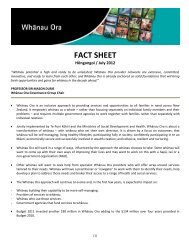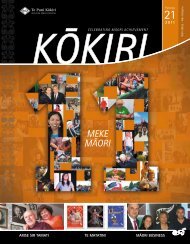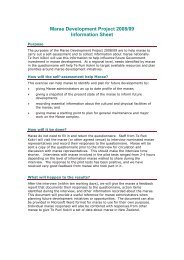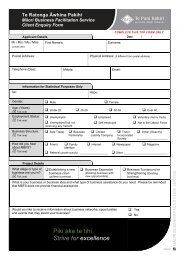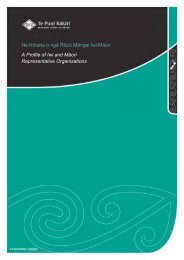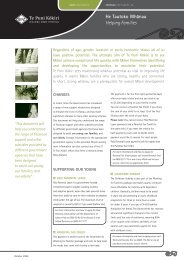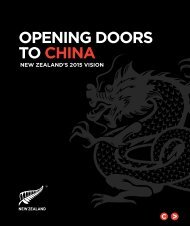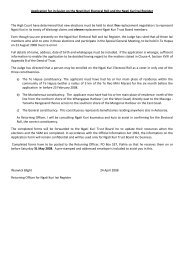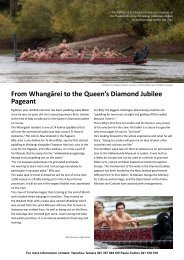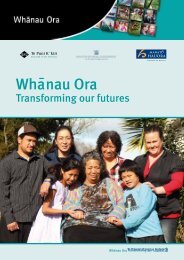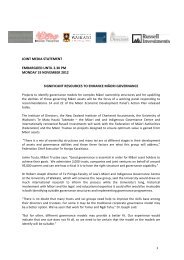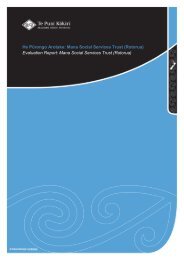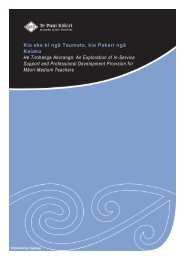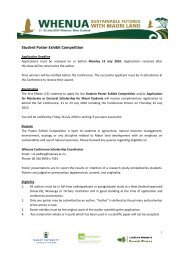Download the PDF (6.0MB) - Te Puni Kokiri
Download the PDF (6.0MB) - Te Puni Kokiri
Download the PDF (6.0MB) - Te Puni Kokiri
You also want an ePaper? Increase the reach of your titles
YUMPU automatically turns print PDFs into web optimized ePapers that Google loves.
Manu Ao weekly online seminars<br />
will start in July 2009. The fi rst<br />
seminar by Tä Tipene O’Regan,<br />
will discuss reclaiming <strong>the</strong><br />
usage of Mäori place names.<br />
O<strong>the</strong>r presenters include Moana<br />
Jackson speaking about <strong>the</strong><br />
foreshore and seabed issue, and<br />
John Tamihere on <strong>the</strong> proposed<br />
Auckland super city. O<strong>the</strong>r<br />
planned initiatives include a<br />
national symposium on Mäori<br />
leadership, set to take place in<br />
2010.<br />
Rahui Katene and Dr Kathie Irwin<br />
Professor Roy Sharp, Professor Piri Sciascia,<br />
Professor Mason Durie and Peter Adds<br />
<strong>Te</strong> <strong>Puni</strong> Kökiri aims to<br />
promote robust kaupapa<br />
Mäori and strengthsbased<br />
research that<br />
supports Mäori. If you<br />
would like to talk to us<br />
about any of <strong>the</strong> research<br />
profi led here, or your own<br />
research, contact us at<br />
research@tpk.govt.nz<br />
RANGAHAU<br />
LANGUAGE IN THE WORKPLACE<br />
Victoria University has been investigating and studying <strong>the</strong> language<br />
used by effective leaders in Mäori and Päkehä organisations.<br />
The Language in <strong>the</strong> Workplace<br />
project team, with <strong>the</strong> support<br />
of Harima Fraser (<strong>Te</strong> <strong>Puni</strong> Kökiri)<br />
and Mike Hollings, has recorded,<br />
transcribed and analysed<br />
meetings of all kinds in four<br />
different organisations, two<br />
Päkehä and two Mäori.<br />
The two Mäori organisations<br />
were companies dedicated to<br />
working for Mäori where tikanga<br />
played an important role in<br />
everyday operations.<br />
Interactions in <strong>the</strong> two Mäori<br />
organisations also indicated an<br />
awareness of <strong>the</strong> importance<br />
of humility or whakaiti and<br />
a tendency to emphasise <strong>the</strong><br />
group over <strong>the</strong> individual.<br />
Mäori leaders tended to tell<br />
stories about how <strong>the</strong>y learned<br />
from <strong>the</strong>ir mistakes. And<br />
when something needed to<br />
be improved, or someone had<br />
made an error, Mäori leaders<br />
were more likely to talk about<br />
<strong>the</strong> issue as a general one, even<br />
discussing it with humour where<br />
possible, ra<strong>the</strong>r than pointing<br />
<strong>the</strong> fi nger at an individual.<br />
“We have generally found that<br />
different organisations do<br />
seem to prefer different styles<br />
of humour,” says Professor<br />
Janet Holmes from Victoria<br />
University’s School of Linguistics<br />
and Applied Language Studies.<br />
“In all four of <strong>the</strong> organisations<br />
where we worked as researchers,<br />
leaders drew on a number of<br />
different strategies in order<br />
to achieve <strong>the</strong>ir workplace<br />
objectives, while also being<br />
considerate of <strong>the</strong>ir relationships<br />
with <strong>the</strong>ir colleagues,” she says.<br />
“Overall, we hope that our<br />
research has contributed to<br />
understanding how effective<br />
leaders operate by providing<br />
empirical evidence of <strong>the</strong> diverse<br />
ways in which leadership is<br />
actually enacted in different<br />
organisations, including <strong>the</strong><br />
very distinctive ways in which<br />
Mäori leaders provide culturally<br />
appropriate leadership in Mäori<br />
organisations.”<br />
One key fi nding was <strong>the</strong> extent<br />
of use of te reo Mäori in some<br />
workplace teams.<br />
Among <strong>the</strong> participants one<br />
leader and his team regularly<br />
used te reo in <strong>the</strong>ir workplace<br />
meetings. However, in many<br />
cases <strong>the</strong> Mäori workplace<br />
participants used English as <strong>the</strong>ir<br />
main language. While much of<br />
this is restricted to greetings,<br />
Mäori concepts and socially<br />
oriented talk, Mäori cultural<br />
norms are evident regardless<br />
of <strong>the</strong> language spoken.<br />
There is undoubtedly more<br />
Mäori language use in Mäori<br />
organisations than in <strong>the</strong> Päkehä<br />
workplaces studied.<br />
TE PUNI KÖKIRI | KÖKIRI | PIPIRI – HÖNGONGOI 2009<br />
41



